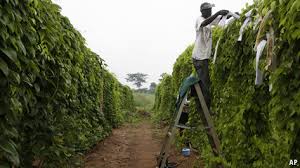 After months of delays and mounting anticipation, Nigeria’s economy has been officially “rebased”. It is now worth $510bn (2013 figures) – an 89% rise, far in excess of analysts’ predictions. Nigeria is now Africa’s largest economy, pushing South Africa to a distant second place.
After months of delays and mounting anticipation, Nigeria’s economy has been officially “rebased”. It is now worth $510bn (2013 figures) – an 89% rise, far in excess of analysts’ predictions. Nigeria is now Africa’s largest economy, pushing South Africa to a distant second place.
It’s long overdue. The United Nations Statistical Commission recommends a statistical rebasing every five years, to
a) account for changes in the patterns of economic activity (consumption and production), such as a country discovering new mineral wealth or getting an infusion of broadband or launching a local car manufacturing industry or seeing an industry lapse into obsolescence
b) update base prices to a more recent year, to account for inflation.
In Nigeria’s case we have not rebased since 1990 – a whole quarter of a century ago. By updating the base year from 1990 to 2010, apart from the necessary adjustment for inflation we have also had to take into account all the changes that have taken place – the impact of the internet and the telecommunications industry, Nollywood, the music industry, the sizeable expansion of the services industry, etc.
The implication of this complicated recalculation is that what we thought was a $270bn economy is actually worth $510bn. It’s the equivalent of suddenly discovering the existence of six Ghanas within Nigeria.
The change is noteworthy for, in the words of finance minister Ngozi Okonjo-Iweala, the “psychological impact” it will have on foreign investors. They will pay greater attention to Nigeria now that its economy casts a larger shadow than South Africa’s and display new confidence that will potentially be rewarded with lucrative gains, especially at a time when value-laden sectors such as power are opening up in unprecedented ways.
Business will also boom for hotel owners, travel agents, airlines, and events planners as the number of Nigeria-focused trips and investment conferences (already a booming industry since 2013) swell. Scammers might even be expected to cash in as well. (“Good Day dear friend, I am Lamido Sanusi, governor of the central bank of the newly rebased west African nation of Nigeria…”)
And you just wait to see what will happen as the rebasing placebo begins to take effect in the government’s bloodstream. The president’s 2015 re-election campaign has just been swelled by a stand-alone chapter. Even though the story worth celebrating here is really the one about the boldness demonstrated by the National Bureau of Statistics in finally facing up to the long-overdue challenge of revising the country’s near-useless economic data, in the weeks ahead traditional Nigerian praise-singing will predictably morph it into an economic miracle for which the credit belongs to the president’s “Transformation Agenda” (pdf).
The one class of people who have nothing to gain will be ordinary Nigerians: the market woman in Ibadan, the itinerant shoe cleaner in Lagos, the motorcycle taxi rider in Makurdi, the cattle merchant in Potiskum, the shoe maker in Aba, the newspaper vendor in Abuja; the sprawling class of ‘bottom millions’ condemned by their country to extreme poverty).
The $1,200 by which Nigeria’s per-capita income has suddenly risen will not somehow magically appear in their pockets. For this crowd the news is the sort of sleight of mouth that they’ve since grown to expect from the government. In the aftermath of protests against the removal of fuel subsidies in 2012, President Jonathan announced, in a public broadcast, the creation of 370,000 jobs. Just like that, because everyone knows jobs are created when well-meaning presidential words mix with faith in the hearts of job-hungry citizens.
As one person tweeted at me: “Our rebasing story is like the story of a woman that decided to give her husband four pieces of meat by dividing the tiny one into four.”
Even the positive implications of better quality statistical information, which should support, in the words of one analyst, “better decision-making” by the government means little when one considers the track record of the Nigerian government.
In March, more than 700,000 applicants registered online for a recruitment exercise into the immigration service. Knowing that they were expecting 700,000 candidates did nothing to influence the preparation levels of the test’s organisers. Stampedes ensued. By the end of that day, at least 18 people lay dead. Interior minister Abba Moro, the brain behind the scheme, blamed the dead for being “impatient”.
Which is why no one should be surprised when, weeks from now, a Moro-type (Nigeria’s bureaucracy is laden with them) is quoted as quipping, again predictably – and not tongue-in-cheek: “Nigerians don’t have money? Let them spend the GDP!”



